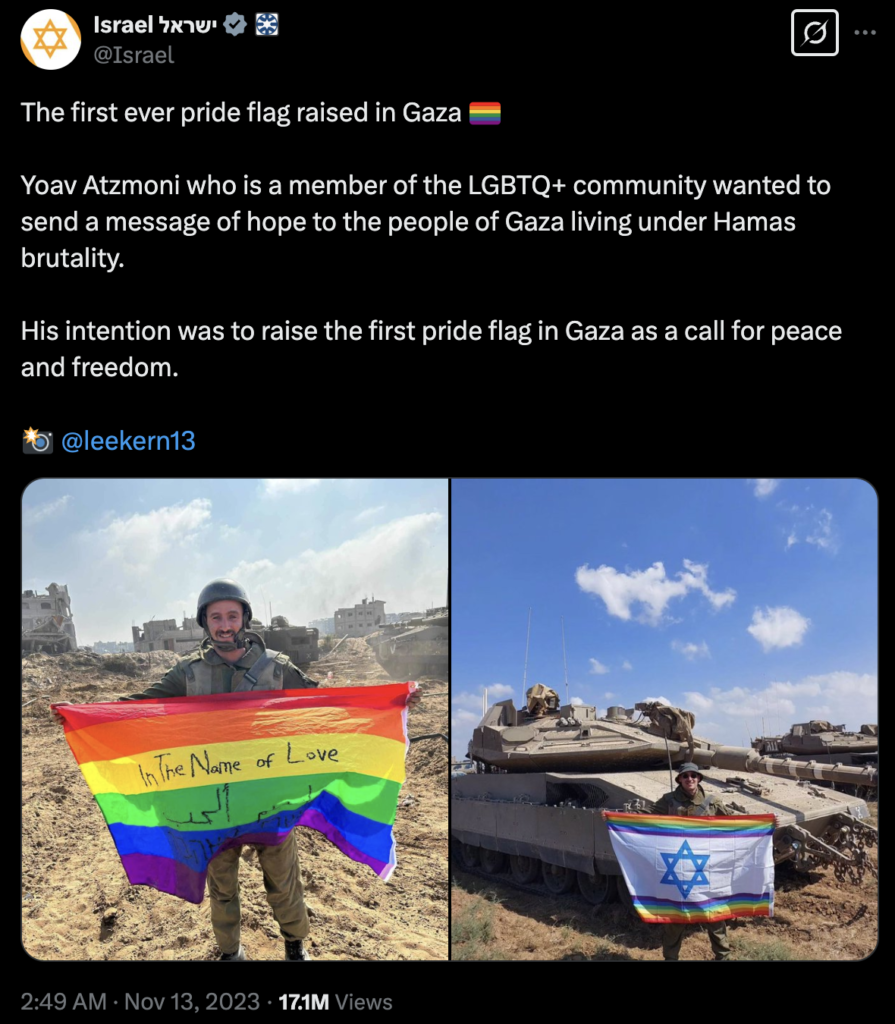Mizuki Uchiyama
June 6, 2024
As Israel continues its attacks on the Gaza Strip, a photo of Israeli soldiers raising the rainbow flag, a symbol of LGBTQ pride, has drawn attention. Here is a nine-minute video I produced and presented about the “pinkwashing,” an image strategy Israel is accused of using.
During Pride Month, a time when sexual diversity is celebrated, you should know is the term “pinkwashing.” Pinkwashing refers to a strategy used by governments or corporations to mask human rights violations or other problematic behaviors by promoting a stance of supporting LGBTQ rights to create a favorable impression. There are other forms of “washing” as well. When companies use terms like “eco-friendly” or “natural” to make their products seem more environmentally friendly than they actually are or to cover up negative aspects of their business practices, it is called “greenwashing.” So, how is pinkwashing related to war? The term was first used to criticize Israel’s actions in the Gaza Strip.

In November 2023, the Israeli Ministry of Foreign Affairs posted a photo on its official X (formerly Twitter) account showing an Israeli Defense Force soldier raising the rainbow flag in Gaza. The caption read, “We want to send a message of hope to the people of Gaza, living under the atrocities of Hamas.” Keishi Yasui, a researcher at Doshisha University in Kyoto, points out that this is exactly what pinkwashing is – part of Israel’s national public relations strategy.
Israel actively promotes its support for LGBTQ rights to cover up its human rights violations in Gaza, positing itself as a “progressive nation” compared to the Islamic world, which is strictly against homosexuality. While traditional Jewish teachings prohibit homosexuality, Israel is relatively flexible, having legalized homosexuality in 1988. But in Islam homosexuality remains taboo, and many Middle Eastern countries with large Muslim populations impose strict restrictions on LGBTQ people. Yasui points out that the Israeli government, by presenting itself as “the only democratic country in the Middle East where LGBTQ people can live freely,” creates a dichotomy between “oppressive” Islamic nations, including Palestine, and “progressive” Israel as a way to justify its actions against Gaza.
Israel’s attacks on Gaza are not aimed at protecting LGBTQ rights, but by adopting this image, the government is superficially justifying its military actions through pinkwashing. Israel is not the only country that uses LGBTQ-friendliness to advance its political and wartime agendas.
When the U.S. invaded Afghanistan in 2001, the American government highlighted the Taliban’s oppression of women and LGBTQ people, framing the war as “civilized America” against “barbaric Islam.” Jasbir Puar, a researcher in queer theory at Rutgers University, pointed out that this narrative convinced the American public that the invasion was a legitimate action to protect human rights, increasing support for the war. Judith Butler, a prominent gender studies scholar, explained that this narrative emphasizes the cultural conflict between “progressive” countries that accept LGBTQ people and “backward” Islamic values that do not, fueling anti-immigrant sentiments among far-right parties.
Corporations also engage in pinkwashing their images. British media have reported that the major British arms manufacturer BAE Systems sponsors LGBTQ-friendly events to portray itself as a company that cares about human rights. But the weapons BAE Systems produces are exported to Saudi Arabia and used in airstrikes on Yemen, which have caused one of the world’s worst humanitarian crises, with tens of thousands of civilian deaths. By promoting LGBTQ-friendliness, BAE is diverting attention from the fact that it is profiting from war and death.
A Jewish resident of Japan who identifies as queer, who would give their name only as Hannah, expressed their frustration: “When I see large companies using LGBTQ-friendly images and the rainbow flag to advertise their products, it feels like we’re just being used for profit.” Hana said the core of the LGBTQ movement was about protecting human rights. Using “pinkwashing” to justify war, she said, is unacceptable.


